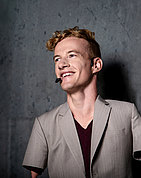
Janis McDavid
Born in Hamburg, grew up in the Ruhr area and attended the Rudolf Steiner School in Bochum. He is studying economics in Witten/Herdecke and has already published his first book: "Your best life: The courage to go beyond yourself and make the impossible possible". He is also a committed expert in the German Bundestag, UNICEF encourager, "YES, YOU CAN" brand ambassador and winner of the International Speaker Slam 2018 in Hamburg.
You can talk about Waldorf school and think what you want. I am happy to have enjoyed exactly this education and to have learned such different things. Especially in today's world, I have quickly experienced the value of how important it is to become a personality at school, a person with social and emotional intelligence, a sense of responsibility and a range of abilities. Because I am convinced that every child has strengths that are waiting to be discovered!
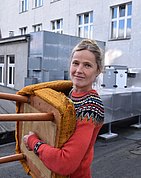
Karoline Eichhorn
She was born in Stuttgart and attended the Kräherwald Waldorf School. Subsequently she worked at the Folkwang acting school in Essen for many years, and as a theater actress. Since the 90s she has been increasingly on the road for TV and film work, most recently in the Netflix series "Dark".
So then, what was school for me? What was it that accompanied, supported and promoted me for 13 years?
I think it was the opportunity to develop as an individual and without any pressure. When I talk to my friends from back then - who by the way are still my friends today - about our school days, we always come back to the same point: having the time and support to be able to embark a personal journey without pressure (e.g. numeric grades given only after 12th grade, a single school community from 1st through 13th grade, subject block lessons), the freedom to decide what to be for or against on one's own. Basically, who am I and who do I want to be? Big questions, and I haven't a clue whether we'll ever find the answers, but we've been sent on our way with a full backpack that has allowed us to observe the world attentively, to develop an awareness of ourselves, others, and the environment.
And when I look around me, all the former Waldorf pupils I know are more than satisfied with the path they have taken.
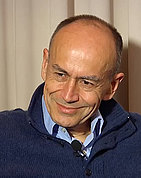
Thomas Christian Südhof
grew up in Göttingen and Hanover and attended the Waldorf School there until he graduated from high school. After studying medicine and obtaining his doctorate, he moved to Dallas (USA), where he became Professor of Molecular Genetics in 1991. Today he is a professor at Stanford University, where he has dedicated himself to the study of synapses. In 2013, together with James Rothman and Randy Schekman, he was awarded the Nobel Prize for Physiology or Medicine.
When my family moved to Hanover, I attended the Waldorf School there from the 2nd grade until high school graduation. Afterwards I studied medicine and later pursued a career as a scientist, which soon led me to the USA, where I have lived for almost 40 years now. I like to recall my time as a Waldorf student, which was very influential for me and left me with mainly positive memories. Two aspects were particularly important for my development. First, the impressive teachers who taught me. Since that time, I have seldom met such convincing and interesting people, and the experience of these personalities has become a lasting contribution to my life, especially since I often argued with these teachers and we disagreed completely. Secondly, I appreciate the freedom of thought and action that I experienced in school. I was mostly allowed to develop my own projects and ideas, which taught me to be independent. For these reasons I am extremely grateful to the Waldorf School in Hanover and its teachers for the education they gave me.
(You can learn more about Prof. Südhof in this video interview with him).
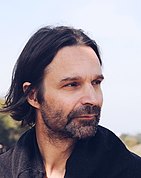
Moritz Rinke
Born in Worpswede, one of the leading writers of his generation and directs the Author's Program at the Berliner Ensemble.
"A few days ago I spoke on the phone with my former English teacher from the Waldorf School in Ottersberg, who also supervised and directed the theatrical performances at the school, for example our 8th grade class play. In the meantime, she must be around 90 and had spontaneously grabbed the phone to congratulate me on my appointment to the Berliner Ensemble. I heard her old, still familiar voice and it was as if I was suddenly back on the Waldorf stage and in the middle of my childhood. Probably that's what I'm so grateful to my school for. She let us be free, she allowed us to act, try things out, and fantasize for longer than is usually allowed pupils in a society that was perhaps already at that time very focused on high-performance. And I can say for myself that I have gained everything through this experience."
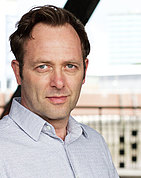
Samuel Weiss
Born in Männedorf near Zurich, he is a well-known theater actor. In addition, he has made guest appearances in film and television productions and is an award-winning radio play narrator. He sits on the jury of the theater competition for Waldorf 100.
When I think of the Waldorf School, I always first think of Joseph Beuys' sentence: "Where have they actually remained, the Waldorf students? All those special people who change the world?" I then always feel that first of all I have this obligation, this burden, to be special. Until now, however, I have neither saved the world nor do I like it when someone asks me if I can dance my name.
I dare not claim that my profession changes the world, and yet I wouldn't have become an actor without the Waldorf School. In the 12th grade I was supposed to play the aged King Lear. The role is also actually too big even for a seasoned actor. At the age of seventeen, at least sixty years too young for the role, I tried to expose myself to Shakespeare's madness and was certainly completely overwhelmed. I wanted to do justice to the monumental nature of the role by stretching my feelings into monumental shape -- cost what it will. So, in my last performance, it was my greatest wish to be able to cry with the dead Cordelia in my arms, to be able to cry unrestrainedly and realistically, to literally let myself dissolve in a sea of tears. To make sure this worked, I thought up a trick. Shortly before the show, I secretly smeared toothpaste in my eyes. But the desired effect did not materialize. I stepped on stage not crying, but foaming out of my eyes. Everyone could see the toothpaste, and obviously the whole situation was ridiculous. But then a small miracle happened, the spectators were somehow moved, a process I can't really explain to myself even to this day. Maybe the audience saw behind the silly trick with toothpaste a serious attempt to get a feeling that was bigger than myself. The ridiculous thing about it actually referred to the sublime, if you wanted to see it. Maybe that's what moved the audience, that someone was exposing himself to the contradiction between absurdity and lunacy. Or maybe I was in that second truly something special, or at least something particularly strange. This is where the core lies, the substance of Waldorf School that I was allowed to take with me. On the one hand it was the only place I had the opportunity to make a serious attempt to artistically come to grips with world literature.
On the other hand – and this seems to me to be much more important – the Waldorf School has managed to arouse a curiosity in me, a desire to simply try things out. And it encouraged me to endure the process, even if it seems ridiculous. In a world that is becoming ever colder and more uniform, I consider this a great gift. But whether or not toothpaste in the eyes is sufficient to make one pass a member of elite in the sense of Joseph Beuys is something one can only decide for oneself.
With this in mind: Dear Waldorf School, Happy Birthday on your first 100 years!"

Josefina Elsler
She attended the northernmost Waldorf school in Germany, in Flensburg. After her school days, she was successful as a sprinter for Germany. She is currently studying journalism and sports in Cologne.
I'm one of those people who likes to look back on their school days. I am really glad I had the privilege of experiencing a Waldorf education for 13 years plus kindergarten. The Waldorf approach has many characteristics that shape the learning and development of children in a special way. I am convinced that the artistic, social, and craft activities and the strengthening of the individual all contributed significantly to my personality. In contrast to many other young people, I was lucky enough to be able to pursue my personal interests outside of school, so that I found my means of expression in athletics alongside theater and music. It was rather a coincidence that I came to athletics at the age of 15 and found a new passion with the core discipline of the 100-meter sprint. In addition to balancing my life with a physical component, I was also able to immerse myself in a completely new world.
The 100-meter sprint is about perfection, you can't afford to make a single mistake if you want to compete at the highest level. To work to that point is a big challenge and an enormous thrill. After graduating from high school, I took up this challenge and concentrated fully on sprinting. I have worn the national jersey of Germany in the European Championships and World Championships, celebrated great successes and suffered painful defeats, but always fought on. The deep insights into high-performance sport and the valuable experiences I have gained around the world have shaped and strengthened me.
Nevertheless, I was never able to get involved one hundred percent in purely competitive sports, but have always sought creative balance and socially-relevant action. When the point came where I realized that I could not develop any further and I felt I lacked the sense of meaning in what I was doing, I decided to close this chapter of my life. Unlike artistic processes, competitive sport is limited by the body. It is nice that I was able to make this decision on my own, because I can now look back with satisfaction to this time and invest my learned willpower, stamina and energy in new projects.
I am looking forward to creating a sports event with the Waldorf Schools that goes beyond the performance of the individual and focuses on networking the schools and jointly achieving athletic goals. I am convinced that anyone who supports this project in a sporting way, no matter with whatever intensity, will encounter something great. From my experience I can say that overcoming physical boundaries is a feeling that fills you with pride and satisfaction.
